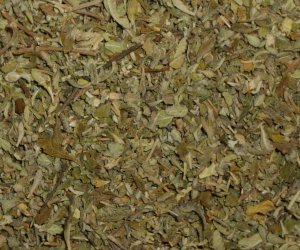| MHS043 | Damiana Turnera diffusa | ||||||||||||||||||||

|
Dried herbs | ||||||||||||||||||||
|
Synonyms
Herba de la pastora, Mexican damiana, Old woman's broom
|
|||||||||||||||||||||

|
|
||||||||||||||||||||
|
Contraindication
Do not take damiana without first talking to your doctor if you are pregnant or could become pregnant. It is not known whether damiana will harm an unborn baby.
Do not take damiana without first talking to your doctor if you are breast-feeding a baby. It is also not known whether damiana will harm a nursing infant. There is no information available regarding the use of damiana by children. Do not give any herbal/health supplement to a child without first talking to the child's doctor. Although rare, allergic reactions to damiana may occur. Stop taking damiana and seek emergency medical attention if you experience symptoms of a serious allergic reaction including difficulty breathing; closing of your throat; swelling of your lips, tongue, or face; or hives.
Contraindication
Do not take damiana without first talking to your doctor if you:
Take a medicine to treat diabetes or to control blood sugar levels such as insulin, glipizide (Glucotrol), glyburide (Micronase, Glynase, Diabeta), tolbutamide (Orinase), metformin (Glucophage), acarbose (Precose), troglitazone (Rezulin), pioglitazone (Actos), rosiglitazone (Avandia), and others; Have a history of breast cancer; Have a psychiatric disorder such as mania or schizophrenia; Have Alzheimer's disease; or Have Parkinson's disease The use of damiana may be dangerous if you have any of the conditions listed above.
General Information
Damiana is a traditional aphrodisiac of the Mayan people in Central America. Damiana continues to be considered valuable as an aphrodisiac and general tonic, and its stimulant, tonic action also makes it a valuable remedy for people with mild depression. Damiana has a strongly aromatic, slightly bitter taste, and the leaves are used in Mexico as a substitute for tea and as a flavoring for liqueurs.
Damiana leaves, drunk in the form of a tea or smoked like tobacco, produced a relaxed state in the user and a kind of subtle high with sexual overtones, somewhat reminiscent of the effects of marijuana. The medication is supposed to be especially effective in women. Damiana liqueurs, produced in Mexico and subtly advertised as aphrodisiacs, contain only minute quantities of the medication. The amount is sufficient, however, to give these beverages a distinctive flavor. Chemical studies have shown that damiana contains between 0.2 and 0.9 percent of a complex volatile oil which is responsible for most of the characteristic odor and taste of the medication. In addition, quantities of a resin, a bitter principle, tannin, mucilage, starch, etc., are present. The reported presence of caffeine requires verifying. No constituent responsible for claims of damiana as an aphrodisiac has ever been identified. On the basis of available evidence, we must conclude that the medication lacks significant physiological activity and that no basis exists for its consumption by human beings. Indeed, the purported virtue of the product has been described as nothing more than an "herbal hoax.
Medicinal Use
Uses
Tonic - Damiana is a tonic and restorative for the nervous system, and has always been considered an aphrodisiac. Its tonic action is partly due to the constituent, thymol, which has an antiseptic and tonic action. Antidepressant - Technically, damiana is a thymoleptic (having a life-enhancing and stimulating action on the body and mind). It is given people suffering from mild to moderate depression and nervous exhaustion. Its stimulating and restorative properties make it valuable when anxiety and depression occur together, as often happens after long-term stress. Sexual restorative - Due to its testosterogenic quality, damiana has always been seen principally as an herb for men, helpful in treating premature ejaculation and impotence. It is, however, beneficial for both men and women, being considered restorative to the reproductive organs of both sexes. Gynecological problems - Damiana is often given for painful and delayed periods, and is used specifically for headaches connected to menstruation. Urinary antiseptic - Being a diuretic and urinary antiseptic, damiana is useful in the treatment of urinary infections such as cystitis and urethritis. This action is partly due to the constituent arbutin, which is converted into hydroquinone, a strong urinary antiseptic, in the urinary tubules. This constituent is also found in number of other plants, notably uva-ursi. Laxative - Damiana is a mild laxative, useful in the treatment of constipation due to poor bowel muscle tone. Other medical uses - Prostate cancer To make a tea, add 250 ml (1 cup) boiling water to 1 gram of dried damiana leaves; allow to steep ten to fifteen minutes. Drink three cups per day; tablets or capsules may also be used in the amount of 400-800 mg three times per day |
|||||||||||||||||||||
|
Related Products
| |||||||||||||||||||||
| POW043 |
Damiana powder
Turnera diffusa
Most powders are special order. Please allow extra time for delivery |
||||||||||||||||||||

|
Herb powders | ||||||||||||||||||||
| TIN053 | Damiana leaf tincture Turnera diffusa | ||||||||||||||||||||

|
1:3 60% | Western Tinctures | |||||||||||||||||||
| FLE091 | Damiana leaf fluid extract Turnera diffusa | ||||||||||||||||||||

|
1:1 60% | Fluid extracts | |||||||||||||||||||


